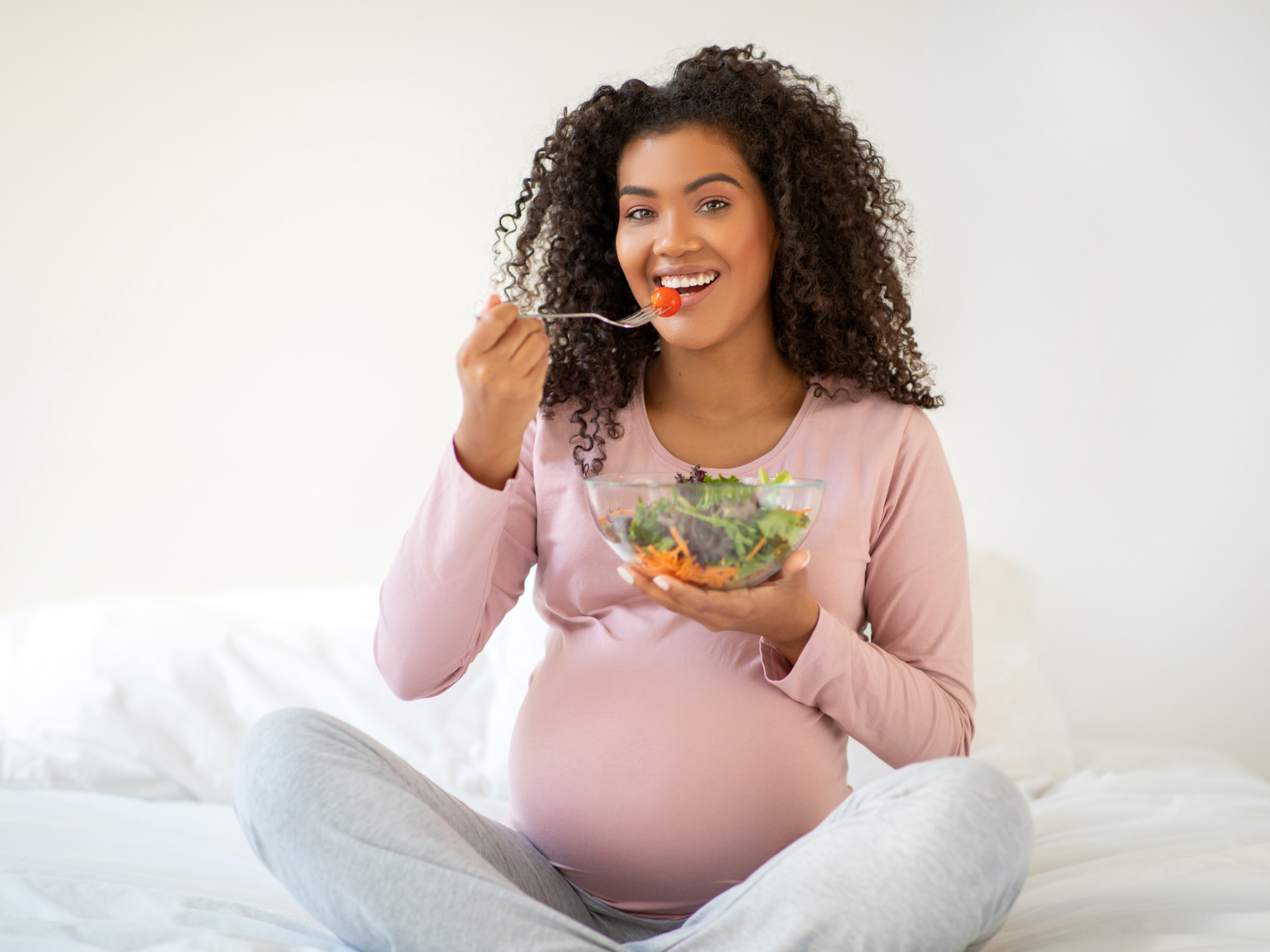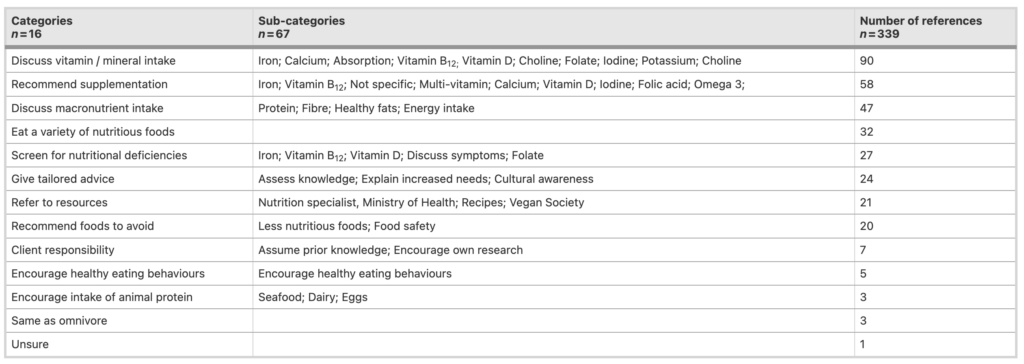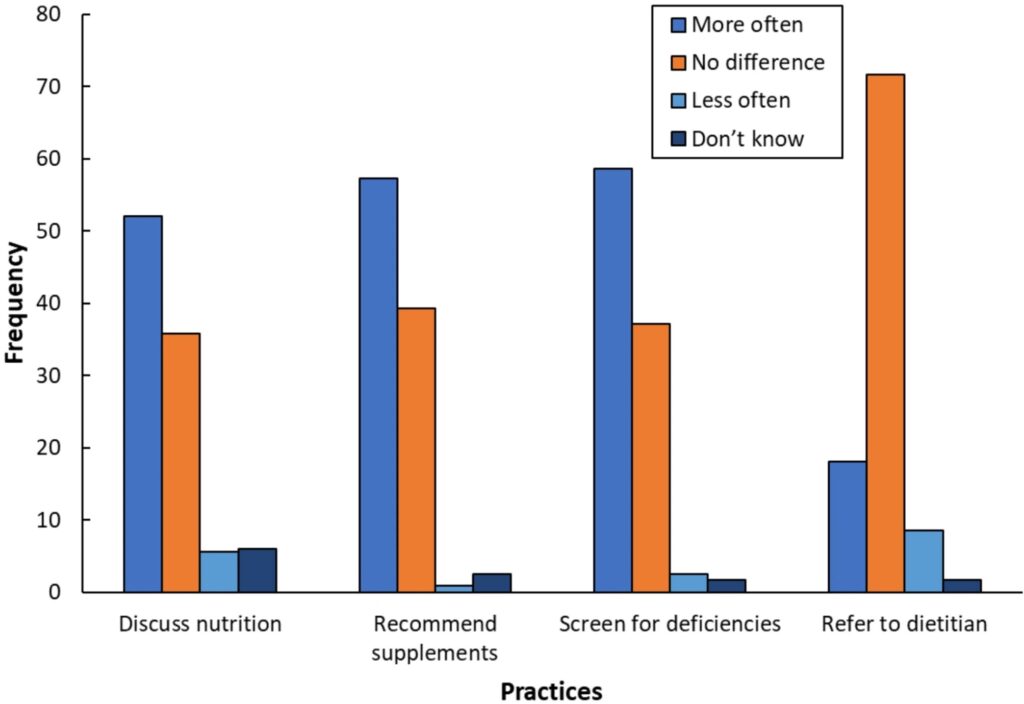
Only 72% of midwives feel prepared to advise pregnant patients on plant-based nutrition, highlighting the need for further education.
While most midwives have a positive attitude towards plant-based pregnancies, many feel unprepared to provide advice to these patients due to a lack of time or because they feel unqualified to do so, according to a new study.
Published in the BMC Pregnancy and Childbirth journal, the research revealed that micronutrient deficiencies and supplementation are the main concerns around plant-based pregnancies. Midwives who don’t eat meat, meanwhile, are much more likely to feel confident about advising their patients on plant-based pregnancies, but they only make up 23% of the total.
The researchers conducted interviews with 133 midwives in New Zealand. While 96% say they feel equipped to give their patients advice on general nutrition, this level of preparedness falls to just 72% for plant-based nutrition. 14% say they’re wholly unprepared to advise on meat-free pregnancies.
“The teaching and training of healthcare professionals in general is still based around omnivorous diets when it comes to nutrition. Nutrition training in most non-nutrition healthcare courses is still lacking, with education on plant-based diets being even less well covered,” says Dr Shireen Kassam, a consultant haematologist and founding director of medical association Plant-Based Health Professionals UK.
“In addition, most country-based dietary guidelines do not provide sufficient advice and guidance on supporting people to eat a healthy plant-based diet,” she adds.
“From the evidence and guidance we have, a well-planned vegan diet can support a healthy pregnancy. Like with all diet patterns, some knowledge and skills around healthy plant-based eating are useful. And given that it’s still rare to find health professionals who understand vegan diets for pregnancy and lactation, we would always recommend seeking support from a nutrition professional with expertise in vegan diets.”
Why many midwives don’t feel qualified to give plant-based advice

While 45% don’t experience any specific barriers towards discussing plant-based nutrition, 36% cite a lack of time, and 30% say they feel unqualified to provide such advice. Other hurdles include client disinterest, concerns about how advice may be perceived as a judgment of lifestyle choices, a lack of knowledge regarding plant-based diets, and the challenge of keeping up to date with changing nutrition advice.
Ensuring that plant-based patients have access to evidence-based dietary information should be a primary objective of maternal care. As the researchers write: “Midwives are frequently recognised as important sources of dietary information during pregnancy. Current findings suggest a potential gap in maternity support for plant-based diet followers.”
To that end, while almost all midwives believe that nutrition is important during pregnancy, nearly 70% say clients are responsible for educating themselves about nutrition. Despite only half agreeing that their patients are knowledgeable about their nutrition needs, 76% expect plant-based clients to have a good knowledge base.
Meanwhile, only 7% and 3% of midwives think plant-based diets are better for mothers’ and babies’ development, with around three in 10 disagreeing – most remain neutral (63% and 68% for mothers and babies, respectively). Even so, more midwives (92%) recommend omnivore patients to adjust their diets to meet nutritional needs, compared to 84% for plant-based clients.
“We don’t have sufficient studies on vegan diets and pregnancy at present, which is probably why there are a variety of answers to this question. In addition, the current media narrative around plant-based diets centres around them being restrictive and nutrient-deficient, and this tends to shape the views and attitudes of healthcare professionals, including midwives,” explains Kassam.
Micronutrient deficiencies are the chief concern. Most midwives believe that plant-based diets leave patients more susceptible to iron deficiency or anaemia (78%) and a lack of vitamin B12 (75%). Over a quarter of midwives discuss vitamin and mineral intake with pregnant patients who follow meat-free diets, and a sixth recommend supplementation.
Less than 1% encourage them to add animal proteins to their diets. And nearly three in 10 say these patients are less likely to develop hypertensive disorders of pregnancy than those who eat meat.

Public health resources need an overhaul
The study found that most midwives have had patients who follow restricted diets, including vegetarians (encountered by 90% of care professionals) and vegans (63%).
Meanwhile, those who follow an omnivore diet themselves are less likely to agree with the statement that vegan diets are better for expecting mothers and their infants. “Given the influence of midwives’ own diets on their attitudes and beliefs about plant-based diets, it is important midwives have access to reliable evidence-based information to inform their own diet choices,” the authors say.
The gap in confidence in providing nutritional advice on plant-based pregnancies is nothing new – previous research shows that this phenomenon has had little improvement over 28 years of analysis, with midwives feeling unprepared to advise on plant-based diets (thanks to a lack of knowledge), and feeling least equipped in advising vegetarian clients (compared to other common nutrition-related conditions).

That said, the preparedness to advise on general and plant-based nutrition in this latest study was higher than in previous research – in one study, 87% reported moderate to high confidence in providing general nutrition advice, but only 41% aid so for vegetarian diets.
“Although the prevalence of formal nutrition training appears to have increased, it is possible the education standards regarding nutrition require more plant-based-diet-focused content, or recent curriculum changes are yet to be reflected within the workforce,” the researchers write.
“Gaining relatively specialised knowledge from general public health resources is challenging, and there remains a significant information gap in terms of plant-based diets,” they add. “There is a clear need for an evidence-based, public-health resource specifically for plant-based diets during pregnancy, to minimise midwife burden and ensure clients can easily access relevant information.”
Kassam adds: “It is clear from our own research that health professionals, including dietitians, would benefit from more teaching and training on plant-based and vegan diets, given they are becoming more popular and given that they are recognised as being necessary for their co-benefits for environmental health.”
The post Lack of Time & Training Holding Back Plant-Based Nutrition Support During Pregnancy appeared first on Green Queen.
This post was originally published on Green Queen.